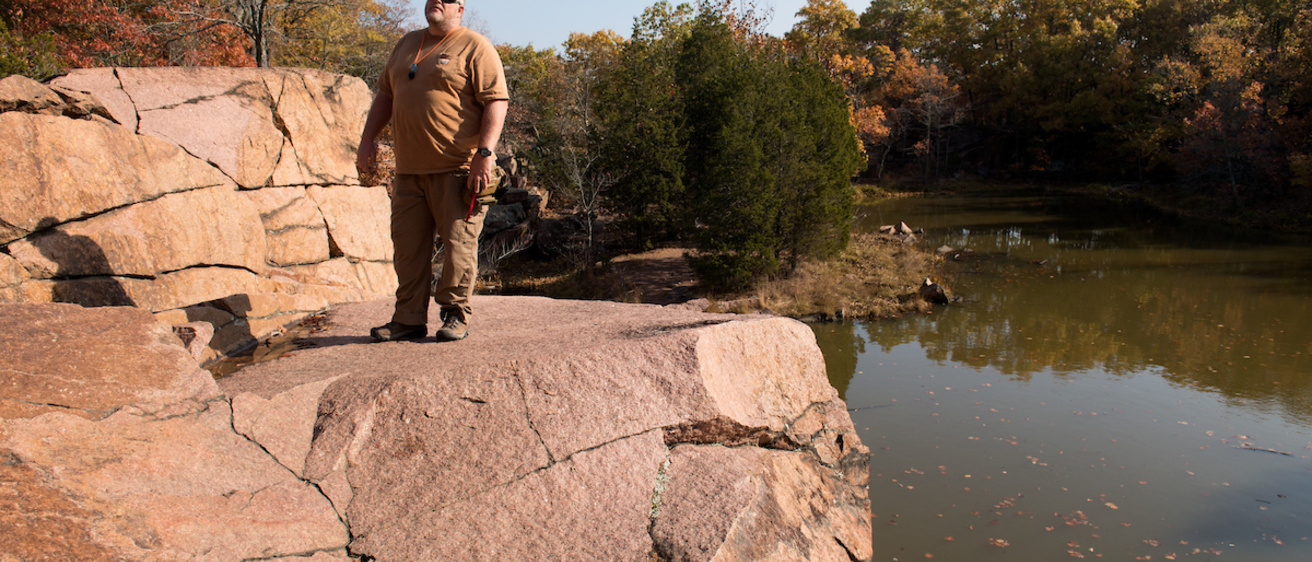Clint Henning is proof that it’s never too late to return to school.
The 45-year-old former Marine, founder of a utility contracting business, volunteer firefighter, and owner of myriad life experiences, decided six years ago to get a college degree. After transferring from a community college to the University of Iowa, the Walcott, Iowa, native is on track to earn a Bachelor of Science degree in geosciences in May 2019.
“It’s been hard work, but I keep seeing a payoff at the end,” says Henning, who lives with his wife, Denise Heath, in a house they built outside Lowden, Iowa. “I won’t have to worry about working until I’m 80 and wondering what’s next.”
Indeed, Henning already knows that after graduation he would like to work as a field technician in hydrology or another area in geology.
“I don’t want to be the person at the desk analyzing data,” he says. “I want to be the person outside collecting the data.”
How and why Henning decided to enroll in college is a circuitous story. He freely admits that he didn’t pay full attention to his studies at Bettendorf High School, graduating simply so he could join the military. But in 1993, two years into a job as a diesel mechanic with the 7th Motor Transport Battalion at Camp Pendleton, California, Henning hurt his back wrenching a lug nut on a large vehicle (called a Logistics Vehicle System, or “Dragon Wagon,” by Marines) used for ferrying heavy equipment. He received an honorable medical discharge, but, suddenly, he needed to decide what would be next.
He found work as a motorcycle mechanic and later as a utility contractor—and tacked on a six-month stint as a contract firefighter in Iraq for good measure. When he returned from Iraq in 2007, he started his own utility contract business, Ditch Diggers, LLC, and settled into life as a self-employed businessman, contentedly living with Denise and their stable of German Shorthaired Pointers.
“I was just doing my thing,” Henning says.
But Henning’s life was about to take another turn that ultimately pointed him to a college degree.
In the summer of 2009, he developed a blockage in an artery in his lung, called a pulmonary embolism, which landed him at the UI Hospitals and Clinics. A social worker signed him into the U.S. Department of Veterans Affairs system, and soon, Henning received brochures about educational opportunities available to him.
He initially dismissed the literature and says he filled out an application “with doubts” that he wanted to take college classes. But the lure of tuition-free education intrigued Henning enough to enroll at Kirkwood Community College. When he took his first earth sciences class, he realized he was hooked.
“As I took the course, I thought, ‘Dummy, this is something you’ve liked all along,’” Henning says.
What really piqued his interest was geomorphology, or learning how the Earth is a living, breathing body that is constantly changing—through volcanism, water, erosion, continental plate movements, and other effects.
“What really interests me in geomorphology is the amount of energy needed to take place to cause those physical changes,” Henning says. “These processes are constantly happening under our feet, but it’s at such a slow pace we don’t even notice.”
Henning transferred to the UI in the fall of 2016 and soon found a research opportunity with Emily Finzel, assistant professor in the Department of Earth and Environmental Sciences. He started by logging data from drilling cores done by oil surveillance companies in south-central Iowa. (The cores showed little evidence of oil reserves.) Finzel says she appreciated Henning’s self-motivation and ability to work independently.
“I liked that he is more experienced than the average student and, based on my observations of him, a leader among his peers,” she says.
Last summer, Henning landed an internship with the Iowa Geological Survey, based at the UI, to separate and date a mineral called zircon found in rock samples gathered across Iowa. The data would allow researchers to determine whether rocks from different regions of the state were the same. He quickly mastered several techniques used in the mineral-separation process and improved one device, which mimics how Gold Rush panhandlers shook a tray to separate gold, with a swinging arm and cup that slowly dispenses ground-up rock onto a vibrating surface.
“Clint can be described as a go-to guy,” Finzel says. “If something needs to be done, especially with a time-sensitive aspect, Clint will work until it is completed…and usually ahead of schedule. His work has been impeccable, and he has my fullest confidence when it comes to pretty much any task I give him.”
Henning smiles when asked to compare his views on education now versus when he graduated from high school.
“Then, I did it because I had to get a high school diploma to enter the service,” he says. “Now, I do it because I want to, and the thirst for knowledge is there.”
